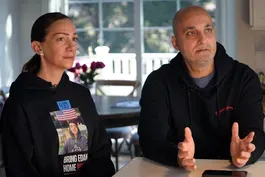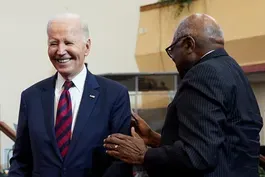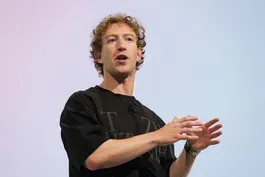
Sen. Wyden offers way forward for progressives in new book
Clip: 1/19/2025 | 5m 30sVideo has Closed Captions
Sen. Wyden offers way forward for progressives in new book ‘It Takes Chutzpah’
As Trump returns to the White House with Republicans in charge of the House and Senate, Democrats are searching for a way forward. Ron Wyden, the second-most senior Senate Democrat, offers strategies in a new book, “It Takes Chutzpah: How to Fight Fearlessly for Progressive Change.” Amna Nawaz recently sat down with Wyden.
Major corporate funding for the PBS News Hour is provided by BDO, BNSF, Consumer Cellular, American Cruise Lines, and Raymond James. Funding for the PBS NewsHour Weekend is provided by...

Sen. Wyden offers way forward for progressives in new book
Clip: 1/19/2025 | 5m 30sVideo has Closed Captions
As Trump returns to the White House with Republicans in charge of the House and Senate, Democrats are searching for a way forward. Ron Wyden, the second-most senior Senate Democrat, offers strategies in a new book, “It Takes Chutzpah: How to Fight Fearlessly for Progressive Change.” Amna Nawaz recently sat down with Wyden.
How to Watch PBS News Hour
PBS News Hour is available to stream on pbs.org and the free PBS App, available on iPhone, Apple TV, Android TV, Android smartphones, Amazon Fire TV, Amazon Fire Tablet, Roku, Samsung Smart TV, and Vizio.
Providing Support for PBS.org
Learn Moreabout PBS online sponsorshipJOHN YANG: As Donald Trump returns to the White House, and with Republicans in charge of both the House and the Senate, Democrats are searching for a way forward.
Ron Wyden, the second most senior Senate Democrat and a leading progressive voice, offers something of a strategy guide in his new book, "It Takes Chutzpah: How to Fight Fearlessly for Progressive Change."
Amna Nawaz recently sat down with Wyden.
AMNA NAWAZ: Thanks for being here.
SEN. RON WYDEN, Senate Democrat: Good to be with you.
AMNA NAWAZ: So you write in this book a lot about your own family story as well, of the child of Jewish refugees who escaped Nazi Germany in the 1930s, how this all inspired the way that you live and work, this idea of chutzpah being central to how you do your work for the uninformed among us.
How do you define it?
RON WYDEN: It is inherently good, and it is the indispensable instrument to have a better life in America.
It's about grit, it's about nerve, it's about taking on big odds.
For example, I was just a kid who had sort of had my start working with senior citizens after I was dreaming of playing in the NBA.
And that didn't work out.
And the senior citizen said, why don't you run for Congress?
And I was 29 years old.
I'd never run for student body eraser cleaner.
I had never done anything political.
But one of them said to me, looked at me and talked about chutzpah.
She said, nobody can say no to their grandmother.
And I got elected to Congress.
AMNA NAWAZ: You do lay out how this value is really driven you over your four decades in Congress.
When you look where your party is right now, though, having just lost an election, essentially leaderless, where do you see that chutzpah?
RON WYDEN: Well, we've got to focus on what's really important to people.
I'm going home here in a day or so, and I have town hall meetings, something else nobody's ever done.
People thought that took a lot of chutzpah.
But at 1100 town meetings, we just throw open the doors.
We let people give their opinion.
And I can tell you the concerns are ones where the second word is always bill.
It's health care bill, it's housing bill, it's electric bill.
And the social issues are incredibly important.
I was the first senator to support marriage equality.
I did it with one sentence.
I said, if you don't like gay marriage, don't get one.
That took a lot of chutzpah.
So we got to focus on the economics that people are talking about in their kitchens and living rooms.
AMNA NAWAZ: You're saying Democrats didn't do enough of that in the past.
They should do more of it moving forward.
RON WYDEN: The message was hard to follow.
For example, when we talked about food prices and getting clobbered over the head when you walked into a grocery, we really didn't talk about the big issue that I fought for, which was the Albertsons and Kroger's merger.
If that had gone through and I led the opposition to it would have been the biggest food merger in American history.
Ask yourself, did you see a lot of it in the presidential campaign?
Nope.
AMNA NAWAZ: What would you say is sort of the defining strategy for Democrats looking ahead to these next four years?
RON WYDEN: Well, I'll give you distilling out the Trump economic plan.
The Trump economic plan is all about helping people at the top and cutting Medicaid and hunger programs to pay for it.
And our policy is giving everybody in America the chance to get ahead.
The Republicans are talking about helping the people at the top, and then they basically, they won't say it this way.
Hope everything trickles down to somebody who might be a checker in a grocery store.
AMNA NAWAZ: You also write a lot about how this inspired you to reach across the aisle to pursue bipartisan work that other people weren't.
You wrote in a government allegedly paralyzed bipartisan gridlock, I routinely team up with deeply conservative Republicans to pass legislation.
We're speaking now at a time when even someone like Mike Turner, right, a congressman who's known for having a bipartisan working reputation, lost his spot on the Intelligence Committee, reportedly because President Trump doesn't want him there.
Do you think Republicans are incentivized to work with you across the aisle if the president doesn't want them to?
RON WYDEN: Well, we'll see.
You know, they're always worried about primaries.
You know, they're worried that they'll have a primary if they oppose Trump.
And you know what?
I did, and you see it in one of the chapters, the one that focuses on my work with the internet, the 26 words that created the Internet.
I found one of the sharpest Republicans, Chris Cox.
We were both young.
We wanted to come up with the ground rules for the Internet.
I came, believe it or not, to the Senate when only one person knew how to use a computer.
And I wrote the law, for example, on the digital signatures issue, which is how I signed the book.
AMNA NAWAZ: Do you see common ground, though, that you can work with Republicans on moving forward?
RON WYDEN: I do.
And my crapo.
He and I wrote the bill to rein in these pharmacy benefit managers.
They're called PBMs.
They used to make sense 30 years ago when we didn't have a lot of data and people didn't have technology.
Now these PBMs are too often ripping off taxpayers and seniors.
Mike Crapo and I talk about how were going to have another bipartisan effort.
We almost got it passed last Congress.
AMNA NAWAZ: Oregon senior Senator Ron Wyden, author of the book "It Takes Chutzpah: How to Fight Fearlessly for Progressive Change" Thank you so much for being here.
RON WYDEN: Tell everybody, use your chutzpah.
Father of U.S. hostage hopeful for son’s release by Hamas
Video has Closed Captions
Father of U.S.-Israeli hostage hopeful for son’s release as Gaza ceasefire gets underway (5m 29s)
The history and tradition of presidential transition letters
Video has Closed Captions
The history and tradition of presidents leaving personal notes for their successors (4m 20s)
News Wrap: Biden thanks supporters on last day of his term
Video has Closed Captions
News Wrap: Biden thanks supporters in South Carolina on last full day of his term (2m 18s)
Tech and AI leaders make big donations to Trump inauguration
Video has Closed Captions
Leaders in tech, AI and cryptocurrency make big donations to Trump inauguration (5m 42s)
Providing Support for PBS.org
Learn Moreabout PBS online sponsorshipMajor corporate funding for the PBS News Hour is provided by BDO, BNSF, Consumer Cellular, American Cruise Lines, and Raymond James. Funding for the PBS NewsHour Weekend is provided by...
















